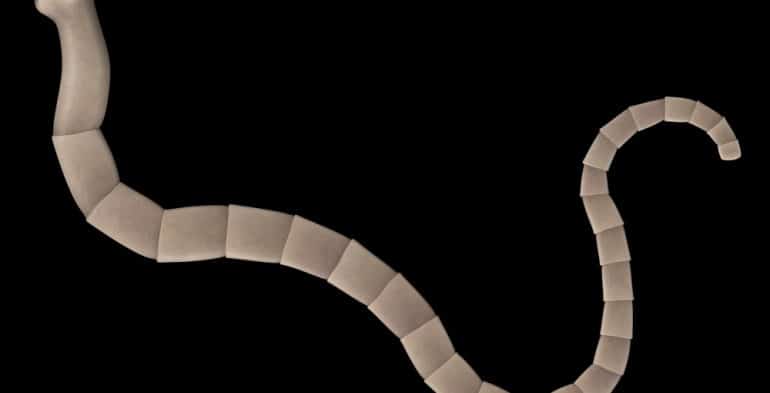
How tapeworms infect children
Tapeworms can cause intestinal infections in people, and once they are in situ they require human hosts to live out their life cycle. A number of different species of tapeworm including from beef, pork and fish can cause infections. Tapeworms infect children through contact with contaminated feces found in water, soil or food. Children can become infected though eating undercooked or raw meat or fish that are infected with tapeworms. Contaminated food contains cysts of the parasite which are ingested into the child’s intestinal tract.
When a child eats a tapeworm cyst it survives in the stomach and releases larvae; the parasite grows within the child’s intestines to become an adult tapeworm which has up to 1,000 segments each of which contain up to 100,000 eggs. These segments break away from the adult tapeworm and travel out of the child in the child’s stool; this can sometimes be seen moving in the child’s stool or near their anus.
Signs and symptoms
Tapeworm infection is often symptom free. When symptoms are present the can include
- Nausea and diarrhea
- Stomach pain
- Sighting of the tapeworm segments in your child’s stool or in their underwear.
- Fish tapeworms can deplete vitamin B12 which in prolonged cases can cause pernicious anemia.
- Children who are infected with pork tapeworm eggs can develop tapeworm cysts within their internal organs; if these occur in the brain they can cause serious problems such as seizures or behavioral issues.
Diagnosis of tapeworms in children
Your doctor will take a stool sample and test for eggs or worm segments. Not all infection with tapeworm involves the growth of an adult tapeworms and so does not present with the symptoms of detecting worm eggs or segments, however a blood test can identify antibodies indicating an infection.
Treatment of tapeworms in children
Treatment is usually simple and your doctor will prescribe oral drugs often in a single dose. Drug treatment is very effective and can completely kill the parasite.
Prevention of tapeworms in children
To reduce your child’s risk of developing tapeworm infections do not permit them to eat undercooked fresh water fish, beef or pork. Encourage good hygiene including regular hand washing especially after using the bathroom, playing in the dirt, and before eating. Only drink water you know is clean. Wash all food well before cooking.
Complications of tapeworm infection in children
In rare cases tapeworms can cause serious problem if newly hatched worms travel from the intestines into other organs such as the liver or brain. These worms form sacs called cysts which can stop the affected organ working properly. This only occurs with the eggs of a type of tapeworm found in pigs and can only happen if a child ingests a tiny bit of feces from an infected pig not from eating pork.
- Symptoms, depending on where the cysts are may include:
- Headaches
- Seizures
- Yellowing of the skin and eyes (jaundice)
- Respiratory problems such as cough, shortness or coughing up blood
- Problems with vision
Cysts can be difficult to treat. Treatment may involve a long course of anti-worm medicine and possibly surgery to remove the cysts.
When to consult your child’s doctor
- Your see any worms or bits of worm in your or your child’s stools.
- Your child has any worrying symptoms that don’t go away, such as tummy pain, diarrhoea, or weight loss
- If you see a worm in your child’s stools, it can help to put the poo in a clean container and take it to your doctor. They can then send it to a laboratory to find out what it is right away.
- If you don’t have a sample to bring in, your doctor may give you a container and ask you collect one when your child next does a stool. They may also look for eggs or small worms around your child’s bottom.







